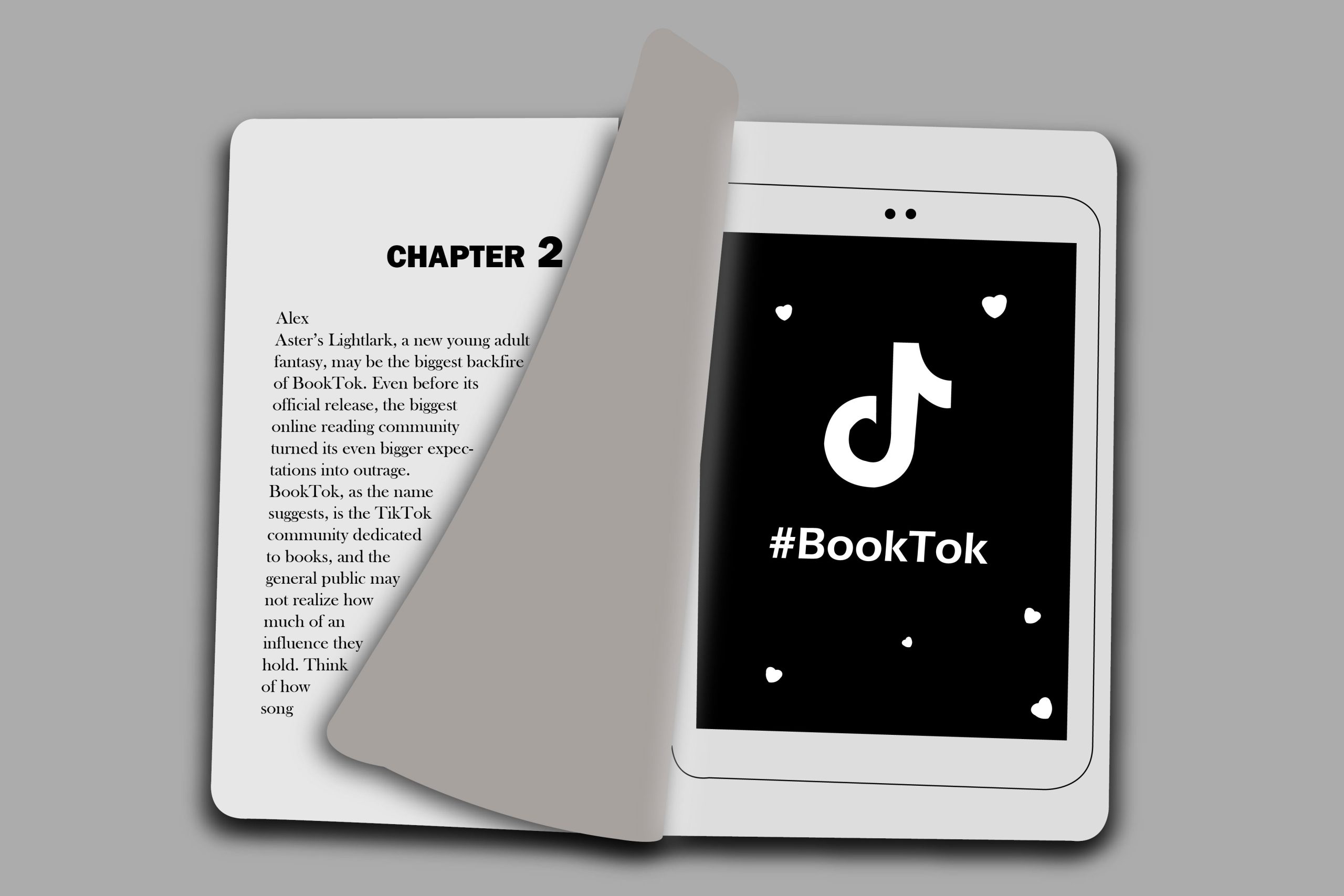

Illustration by Janani Murugesan
By Willow Symonds
Staff Writer
Alex Aster’s Lightlark, a new young adult fantasy, may be the biggest backfire of BookTok. Even before its official release, the biggest online reading community turned its even bigger expectations into outrage.
BookTok, as the name suggests, is the TikTok community dedicated to books, and the general public may not realize how much of an influence they hold. Think of how song snippets going viral on the app can boost the song on the charts, even if said song had existed years prior. The same thing happens with “TikTok books” and bestseller lists – for better or for worse.
BookTok tends to label books with specific tropes and aesthetics. Lightlark’s existence spawned from Aster listing specific tropes to her audience, asking if they would read a book including them. The TikTok got millions of views and plenty of enthusiastic comments, leading to its release a year and a half later, an astonishingly quick time to go from first draft to the bookstore shelves.
One reviewer called Lightlark “the first clickbait novel.” While I don’t fully agree, this might be the first book TikTok hyped its way into publishing.
The TV Tropes website describes a trope as, “a storytelling shorthand […] the audience will recognize and understand instantly.” A trope isn’t the entire story, nor does it describe an entire character or setting. Yet, why does BookTok use a few select tropes to describe entire works?
When chosen and described correctly, recommending a book based on tropes or comparing a new novel to a popular pre-existing one can help said book reach its target audience.
Unfortunately, this marketing tactic isn’t limited to teenagers on TikTok.
In late August, Harry N. Abrams publishing released Lightlark advanced reader copies to people who’d pre-ordered the book. To their surprise, lines of dialogue and entire scenes Aster talked about online weren’t in the advanced-release copies. When a reader on TikTok asked about this, Aster told them that these scenes did exist at first but changed with edits and rewrites, and that two chapters missing from the advanced copies will be in the official book. I don’t think that Aster is lying, but I internally questioned why she promoted her book in such a misleading way.
Then I remembered; tropes are the entire reason her original TikTok went viral. In later TikToks, Aster also promoted the story’s diversity, only for readers to be disappointed Lightlark had little on that front too.
Even without the drama and negative reviews, I wouldn’t have read Lightlark. The Hunger Games was a staple in American pop culture, but I can only read about a deadly competition among teenagers in otherworldly arenas and love-triangles so many times (an oddly specific set of tropes found in many early-2010s YA), and I definitely don’t want to read a book that almost everyone says is just bad.
This is the first time BookTok collectively pointed out false advertising, and it might be the first time they realized valuing tropes over substance leads to subpar books. However, this isn’t the first time an author or publisher has done this sort of thing. Although Lightlark’s average Goodreads rating was bombed with one-star reviews before official release (and I don’t condone people rating books they haven’t read, no matter positively or negatively), other authors have capitlized on specific tropes and
enemies to lovers is a popular trope, both on TikTok and for marketers to use to their advantage. The WSJ bestselling Zodiac Academy series by Caroline Peckham and Susanne Valenti is an extreme example of this, as the plot and character arcs are nothing but new-girls-at-the-barely-developed-magic-college falling in love with their bullies. In the second or third book, the two girls suddenly decide that the guys’ psychopathic behavior is endearing.
A Court of Thorns and Roses also has love interests which readers criticized for being controlling and abusive without repercussions, so I think this goes into a related discussion about teen girls romanticizing the wrong things in fictional characters.
I won’t pretend that nothing good has come out of BookTok. Many BookTokers value diversity and promote #OwnVoices stories, of which I’m a huge fan. I’ve read several good books because of the app (Evelyn Hugo and Celia St. James will always have my heart), and I have plenty of BookTok novels on my to-be-read list. TikTok in general has introduced me to music, content creators, and more that might’ve stayed out of my radar otherwise.
Even so, the past few years have shown what TikTok is truly capable of influencing. If the internet realizes both the good and the bad that emerge from this, then maybe we can stop the app’s worst elements from seeping into real life.
Below are recent employment want ads that have been posted with WCC Center for Career…
Patrick Sullivan | Contributor WCC students joined hundreds of other protesters for a March 14…
Meals were longtime tradition at monthly meetings Lily Cole | Editor The long-standing, but little-known…
Abigail Gibb | Contributor President Donald Trump has signed over 100 executive orders since the…
Beck Elandt | Staff Writer Photos by Courtney Prielipp While artificial intelligence can produce a…
Yana McGuire and Sasha Hatinger | Staff Writers Recent attacks against Diversity, Equity and Inclusion…